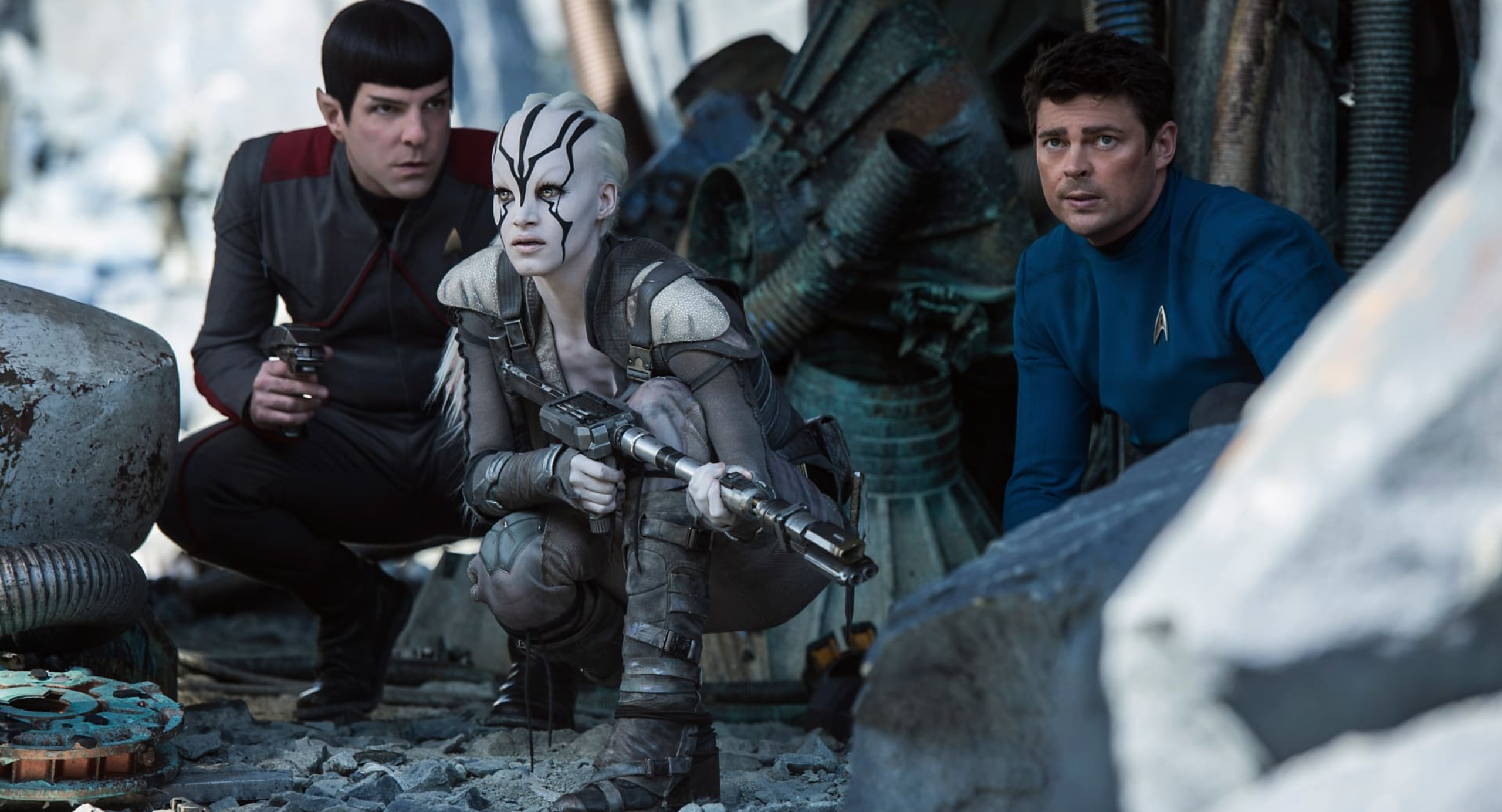Star Trek Beyond – Film Review
Published March 5, 2024

Star Trek Beyond, directed by Justin Lin, hit the screens in 2016 as the third installment of the rebooted Star Trek film series, following Star Trek (2009) and Star Trek Into Darkness (2013). With a screenplay by Simon Pegg, who also reprises his role as Scotty, and Doug Jung, the film embarks on an adventurous journey that combines high-octane action, heart, and humor, embodying the essence of the original Star Trek series while charting a course into new territories. Despite its few pitfalls, Star Trek Beyond offers a thoroughly entertaining experience that pays homage to the franchise’s legacy.
The film kicks off with the USS Enterprise, three years into its five-year mission, docking at the advanced space station Yorktown for resupply. Here, Captain James T. Kirk (played by Chris Pine) contemplates the weariness of deep-space exploration and ponders the sacrifices of following in his father’s footsteps. The existential musing is a strong narrative thread that weaves through the film, providing depth and vulnerability to the character of Kirk, allowing Pine to deliver one of his most nuanced performances in the series.
When the crew embarks on a rescue mission into an uncharted nebula, they encounter the villainous Krall (played menacingly by Idris Elba), leading to the destruction of the Enterprise. The sequence of the Enterprise being swarmed and ultimately dismantled by Krall’s forces is visually stunning and emotionally wrenching, capturing the vulnerability of the crew and the end of an era for the iconic starship.
Stranded on a desolate planet, the crew members find themselves separated and face various challenges. Herein lies the brilliance of Star Trek Beyond – its ability to shine a light on its ensemble cast, allowing each character meaningful arcs and moments. Spock (Zachary Quinto) and Dr. McCoy (Karl Urban) deliver some of the film’s most memorable dialogues, encapsulating the humor and heart that is quintessentially Star Trek. Their dynamic, balancing logic and emotion, humor and solemnity, highlights the film’s thematic emphasis on unity and the strength found in diversity.
The introduction of Jaylah (Sofia Boutella), a resilient and resourceful alien warrior, adds a refreshing dynamic to the cast. Her chemistry with Scotty is delightful, and her backstory adds layers to the narrative, enriching the film’s exploration of themes such as loss, family, and survival.
However, Star Trek Beyond is not without its flaws. The film’s antagonist, Krall, though portrayed with a menacing gravitas by Idris Elba, suffers from a lack of development and clear motivation until the latter part of the movie. This delayed exposition weakens the narrative’s tension and diminishes the impact of the climax. Furthermore, the plot occasionally leans heavily on convenient coincidences and deus ex machina moments, which, while keeping the pace brisk, undermine the film’s otherwise solid storytelling.
Visually, the film is a feast for the eyes. Lin’s direction brings a kinetic energy to the action sequences, seamlessly blending practical effects with CGI to create exhilarating set-pieces that feel tangible and immersive. The destruction of the Enterprise, the motorcycle chase, and the climactic battle in and around Yorktown are standout moments that showcase Lin’s ability to orchestrate complex action while maintaining clear visual storytelling. The film’s score, composed by Michael Giacchino, complements the visual spectacle with a sweeping orchestration that honors the series’ musical heritage while propelling the narrative forward with urgency and emotion.
Thematically, Star Trek Beyond delves into the concepts of unity, identity, and the essence of exploration. It challenges its characters to find strength in their diversity and to redefine their understanding of family, friendship, and duty. These themes are skillfully interwoven with the narrative, providing a thoughtful reflection on the enduring ideals of the Star Trek franchise. The film also serves as a poignant tribute to the late Leonard Nimoy and Anton Yelchin, adding a layer of emotional resonance to its exploration of legacy and loss.
Star Trek Beyond is a vibrant and engaging addition to the Star Trek film series. It captures the adventurous spirit of the original series while injecting it with a modern sensibility that speaks to contemporary audiences. While it may falter slightly in its execution of the antagonist’s arc and rely on certain narrative conveniences, these do not significantly detract from the overall enjoyment of the film. With its compelling character dynamics, visually stunning action, and thematic depth, Star Trek Beyond stands as a testament to the enduring appeal of the Star Trek universe, making it a worthy journey for fans and newcomers alike.
